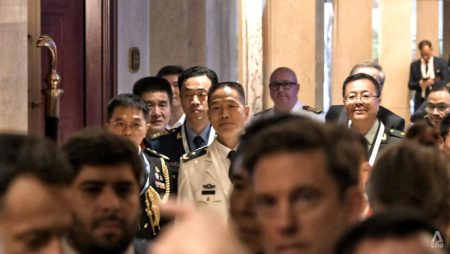The joint statement issued by the Malaysian and Singaporean prime ministers following their retreat on January 7, 2024, addressed a key aspect of their bilateral relationship: the provision of air traffic services over Southern Peninsular Malaysia. The statement unequivocally affirmed that the existing delegation arrangements for these services do not impinge on the sovereignty of either nation. This clarification is crucial for understanding the context of the air traffic management system in the region and for appreciating the cooperative spirit guiding the two countries’ approach to this complex issue. The reaffirmation of sovereignty underscores the mutual respect and understanding that forms the bedrock of the Malaysia-Singapore relationship.
The air traffic management system in the region is intricately linked to both countries’ aviation sectors. Efficient and safe air navigation is paramount for the smooth functioning of their respective airports and airlines. The airspace over Southern Peninsular Malaysia plays a critical role in air traffic flow for both countries, making effective coordination and management essential. The delegation arrangements, which involve Singapore providing air traffic control services for certain sectors of Malaysian airspace, have been in place for several decades. These arrangements arose from practical considerations related to air traffic density and the strategic location of Singapore’s air traffic control infrastructure. The joint statement emphasizes that these operational arrangements are purely technical and administrative in nature, serving the common goal of optimizing air traffic flow while upholding the highest safety standards.
The historical context of these arrangements adds another layer of complexity to the issue. Historically, Singapore’s air traffic control capabilities played a significant role in supporting the development of Malaysia’s aviation sector. Over time, as Malaysia’s own capabilities grew, the arrangements evolved to reflect the changing landscape. However, the core principle of mutual benefit has remained constant. The recent reaffirmation of sovereignty serves to dispel any lingering misinterpretations or concerns that the delegation of air traffic services might somehow compromise the territorial integrity of either country. It reinforces the message that the arrangements are based on pragmatic cooperation and mutual trust.
The joint statement also implicitly acknowledges the importance of clear communication and transparency in managing such complex cross-border issues. By publicly reiterating their shared understanding of the sovereignty principle, the two prime ministers aim to foster continued confidence and stability in their bilateral relationship. This affirmation of sovereignty removes a potential point of contention, allowing both countries to focus on enhancing their cooperation in other areas related to aviation and beyond. It also sets a positive precedent for addressing similar cross-border management issues that may arise in the future.
Furthermore, the timing of the joint statement, released past midnight after extensive discussions during the retreat, underscores the significance both countries attach to this issue. The careful wording and the deliberate act of publicly reaffirming their shared understanding of sovereignty indicate a commitment to addressing any potential ambiguities or sensitivities surrounding the air traffic management arrangements. This proactive approach reinforces the spirit of partnership and mutual respect that characterizes the Malaysia-Singapore relationship. It demonstrates a shared commitment to resolving potential issues through dialogue and cooperation, thereby strengthening the foundation of their long-standing ties.
In conclusion, the joint statement regarding the air traffic services delegation serves as a crucial reaffirmation of the principles of sovereignty, cooperation, and mutual understanding that underpin the Malaysia-Singapore relationship. It clarifies that the existing arrangements are purely operational and do not impact the territorial integrity of either nation. By addressing this issue head-on, the two prime ministers have solidified the foundation for continued collaboration in aviation and other areas of mutual interest. The statement’s emphasis on transparency and communication reinforces the commitment to fostering a strong and stable bilateral relationship based on trust and respect. This proactive approach sets a positive example for managing complex cross-border issues and paves the way for enhanced cooperation in the future. The reaffirmation of sovereignty not only clarifies the current arrangements but also builds a framework for future collaboration, ensuring that both nations can benefit from a safe and efficient air traffic management system while upholding their respective national interests.









